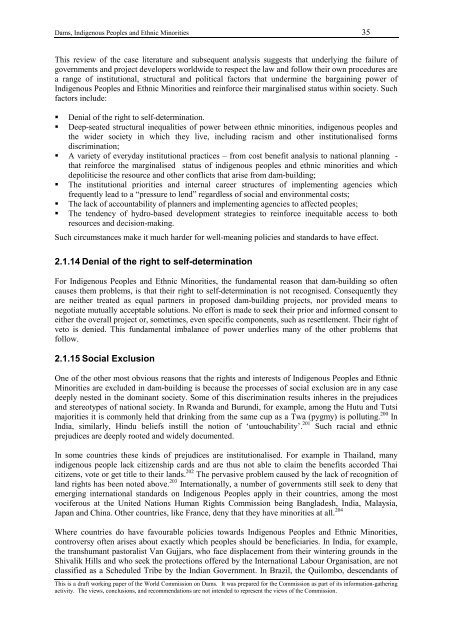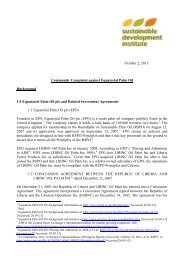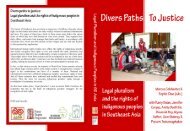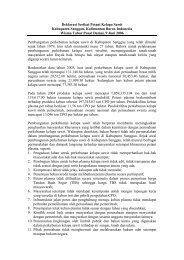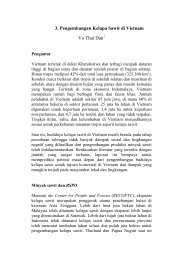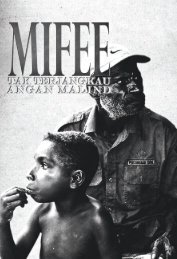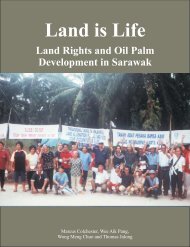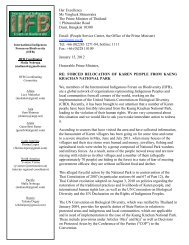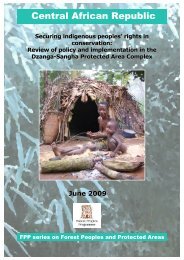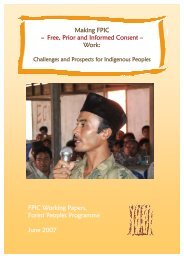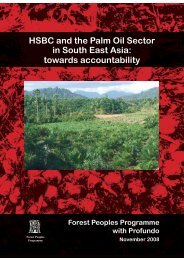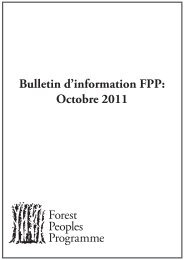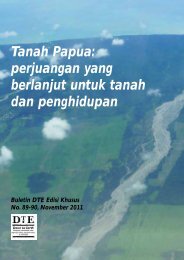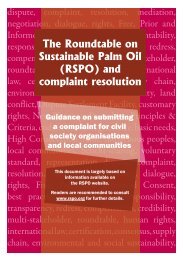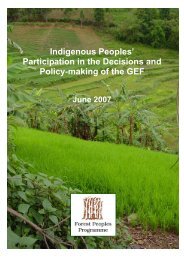Thematic Review II.2: Dams, Indigenous Peoples and Ethnic Minorities
Thematic Review II.2: Dams, Indigenous Peoples and Ethnic Minorities
Thematic Review II.2: Dams, Indigenous Peoples and Ethnic Minorities
Create successful ePaper yourself
Turn your PDF publications into a flip-book with our unique Google optimized e-Paper software.
<strong>Dams</strong>, <strong>Indigenous</strong> <strong>Peoples</strong> <strong>and</strong> <strong>Ethnic</strong> <strong>Minorities</strong> 35<br />
This review of the case literature <strong>and</strong> subsequent analysis suggests that underlying the failure of<br />
governments <strong>and</strong> project developers worldwide to respect the law <strong>and</strong> follow their own procedures are<br />
a range of institutional, structural <strong>and</strong> political factors that undermine the bargaining power of<br />
<strong>Indigenous</strong> <strong>Peoples</strong> <strong>and</strong> <strong>Ethnic</strong> <strong>Minorities</strong> <strong>and</strong> reinforce their marginalised status within society. Such<br />
factors include:<br />
! Denial of the right to self-determination.<br />
! Deep-seated structural inequalities of power between ethnic minorities, indigenous peoples <strong>and</strong><br />
the wider society in which they live, including racism <strong>and</strong> other institutionalised forms<br />
discrimination;<br />
! A variety of everyday institutional practices – from cost benefit analysis to national planning -<br />
that reinforce the marginalised status of indigenous peoples <strong>and</strong> ethnic minorities <strong>and</strong> which<br />
depoliticise the resource <strong>and</strong> other conflicts that arise from dam-building;<br />
! The institutional priorities <strong>and</strong> internal career structures of implementing agencies which<br />
frequently lead to a “pressure to lend” regardless of social <strong>and</strong> environmental costs;<br />
! The lack of accountability of planners <strong>and</strong> implementing agencies to affected peoples;<br />
! The tendency of hydro-based development strategies to reinforce inequitable access to both<br />
resources <strong>and</strong> decision-making.<br />
Such circumstances make it much harder for well-meaning policies <strong>and</strong> st<strong>and</strong>ards to have effect.<br />
2.1.14 Denial of the right to self-determination<br />
For <strong>Indigenous</strong> <strong>Peoples</strong> <strong>and</strong> <strong>Ethnic</strong> <strong>Minorities</strong>, the fundamental reason that dam-building so often<br />
causes them problems, is that their right to self-determination is not recognised. Consequently they<br />
are neither treated as equal partners in proposed dam-building projects, nor provided means to<br />
negotiate mutually acceptable solutions. No effort is made to seek their prior <strong>and</strong> informed consent to<br />
either the overall project or, sometimes, even specific components, such as resettlement. Their right of<br />
veto is denied. This fundamental imbalance of power underlies many of the other problems that<br />
follow.<br />
2.1.15 Social Exclusion<br />
One of the other most obvious reasons that the rights <strong>and</strong> interests of <strong>Indigenous</strong> <strong>Peoples</strong> <strong>and</strong> <strong>Ethnic</strong><br />
<strong>Minorities</strong> are excluded in dam-building is because the processes of social exclusion are in any case<br />
deeply nested in the dominant society. Some of this discrimination results inheres in the prejudices<br />
<strong>and</strong> stereotypes of national society. In Rw<strong>and</strong>a <strong>and</strong> Burundi, for example, among the Hutu <strong>and</strong> Tutsi<br />
majorities it is commonly held that drinking from the same cup as a Twa (pygmy) is polluting. 200 In<br />
India, similarly, Hindu beliefs instill the notion of ‘untouchability’. 201 Such racial <strong>and</strong> ethnic<br />
prejudices are deeply rooted <strong>and</strong> widely documented.<br />
In some countries these kinds of prejudices are institutionalised. For example in Thail<strong>and</strong>, many<br />
indigenous people lack citizenship cards <strong>and</strong> are thus not able to claim the benefits accorded Thai<br />
citizens, vote or get title to their l<strong>and</strong>s. 202 The pervasive problem caused by the lack of recognition of<br />
l<strong>and</strong> rights has been noted above. 203 Internationally, a number of governments still seek to deny that<br />
emerging international st<strong>and</strong>ards on <strong>Indigenous</strong> <strong>Peoples</strong> apply in their countries, among the most<br />
vociferous at the United Nations Human Rights Commission being Bangladesh, India, Malaysia,<br />
Japan <strong>and</strong> China. Other countries, like France, deny that they have minorities at all. 204<br />
Where countries do have favourable policies towards <strong>Indigenous</strong> <strong>Peoples</strong> <strong>and</strong> <strong>Ethnic</strong> <strong>Minorities</strong>,<br />
controversy often arises about exactly which peoples should be beneficiaries. In India, for example,<br />
the transhumant pastoralist Van Gujjars, who face displacement from their wintering grounds in the<br />
Shivalik Hills <strong>and</strong> who seek the protections offered by the International Labour Organisation, are not<br />
classified as a Scheduled Tribe by the Indian Government. In Brazil, the Quilombo, descendants of<br />
This is a draft working paper of the World Commission on <strong>Dams</strong>. It was prepared for the Commission as part of its information-gathering<br />
activity. The views, conclusions, <strong>and</strong> recommendations are not intended to represent the views of the Commission.


